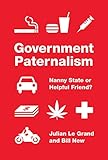Government Paternalism : Nanny State or Helpful Friend? / Bill New, Julian Le Grand.
Material type: TextPublisher: Princeton, NJ : Princeton University Press, [2015]Copyright date: ©2015Edition: Pilot project. eBook available to selected US libraries onlyDescription: 1 online resource (232 p.) : 1 line illus. 5 tablesContent type:
TextPublisher: Princeton, NJ : Princeton University Press, [2015]Copyright date: ©2015Edition: Pilot project. eBook available to selected US libraries onlyDescription: 1 online resource (232 p.) : 1 line illus. 5 tablesContent type: - 9780691164373
- 9781400866298
- Paternalism
- Public welfare
- Social policy
- POLITICAL SCIENCE / Public Policy / Social Policy
- assisted suicide
- asymmetric paternalism
- authoritarianism
- autonomy failure
- autonomy
- choice architecture
- coercion
- consent
- decision making
- efficiency
- ends-related paternalism
- equity
- freedom
- government paternalism
- government policies
- hard paternalism
- harm principle
- interference
- intervention
- judgment
- legal moralism
- legal paternalism
- legal restrictions
- libertarian paternalism
- limited imagination
- limited objectivity
- limited technical ability
- limited willpower
- market failure
- means-related paternalism
- moral paternalism
- motivation
- nanny state
- nudge ideas
- nudge policies
- paternalistic intervention
- paternalistic state
- pensions
- perfectionism
- rationality
- reasoning failure
- risky behavior
- smoking
- soft paternalism
- subsidies
- taxation
- well-being
- 361.65 23
- HV31 .L49 2017
- online - DeGruyter
- Issued also in print.
| Item type | Current library | Call number | URL | Status | Notes | Barcode | |
|---|---|---|---|---|---|---|---|
 eBook
eBook
|
Biblioteca "Angelicum" Pont. Univ. S.Tommaso d'Aquino Nuvola online | online - DeGruyter (Browse shelf(Opens below)) | Online access | Not for loan (Accesso limitato) | Accesso per gli utenti autorizzati / Access for authorized users | (dgr)9781400866298 |
Browsing Biblioteca "Angelicum" Pont. Univ. S.Tommaso d'Aquino shelves, Shelving location: Nuvola online Close shelf browser (Hides shelf browser)

|

|

|

|

|

|

|
||
| online - DeGruyter Communities of Violence : Persecution of Minorities in the Middle Ages - Updated Edition / | online - DeGruyter The Muslim Brotherhood : Evolution of an Islamist Movement - Updated Edition / | online - DeGruyter Development Macroeconomics : Fourth Edition / | online - DeGruyter Government Paternalism : Nanny State or Helpful Friend? / | online - DeGruyter Ideas of Liberty in Early Modern Europe : From Machiavelli to Milton / | online - DeGruyter Nature, Human Nature, and Human Difference : Race in Early Modern Philosophy / | online - DeGruyter Greek Buddha : Pyrrho's Encounter with Early Buddhism in Central Asia / |
Frontmatter -- Contents -- Preface -- 1. Introduction -- 2. What Is Paternalism? -- 3. Types of Paternalism -- 4. Paternalism in Practice -- 5. Paternalism and Well-Being -- 6. The Nanny State: The Challenge from Autonomy -- 7. Libertarian Paternalism -- 8. Paternalism and Policy -- 9. The Politics of Paternalism -- 10. Nanny State or Helpful Friend? -- Bibliography -- Index
restricted access online access with authorization star
http://purl.org/coar/access_right/c_16ec
Should governments save people from themselves? Do governments have the right to influence citizens' behavior related to smoking tobacco, eating too much, not saving enough, drinking alcohol, or taking marijuana-or does this create a nanny state, leading to infantilization, demotivation, and breaches in individual autonomy? Looking at examples from both sides of the Atlantic and around the world, Government Paternalism examines the justifications for, and the prevalence of, government involvement and considers when intervention might or might not be acceptable. Building on developments in philosophy, behavioral economics, and psychology, Julian Le Grand and Bill New explore the roles, boundaries, and responsibilities of the government and its citizens.Le Grand and New investigate specific policy areas, including smoking, saving for pensions, and assisted suicide. They discuss legal restrictions on risky behavior, taxation of harmful activities, and subsidies for beneficial activities. And they pay particular attention to "nudge" or libertarian paternalist proposals that try to change the context in which individuals make decisions so that they make the right ones. Le Grand and New argue that individuals often display "reasoning failure": an inability to achieve the ends that they set themselves. Such instances are ideal for paternalistic interventions-for though such interventions might impinge on autonomy, the impact can be outweighed by an improvement in well-being.Government Paternalism rigorously considers whether the state should guide citizen decision making in positive ways and if so, how this should be achieved.
Issued also in print.
Mode of access: Internet via World Wide Web.
In English.
Description based on online resource; title from PDF title page (publisher's Web site, viewed 30. Aug 2021)


